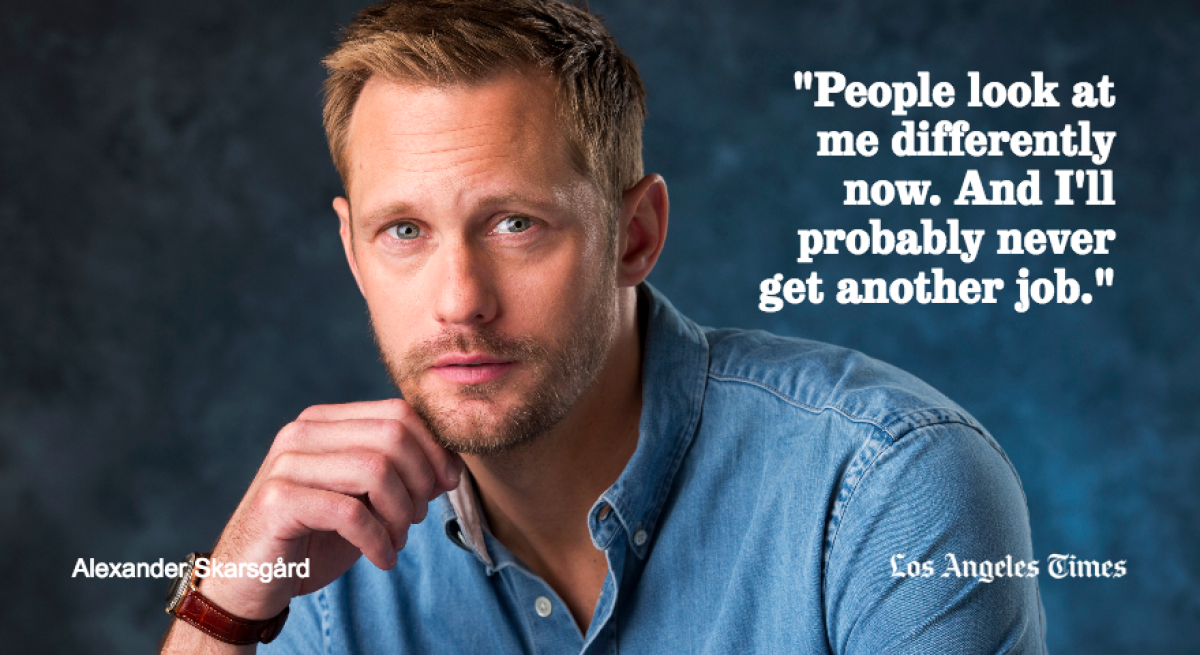Q&A: What can bring TV frenemies together? In âBig Little Lies,â all it took was Alexander Skarsgardâs villain
![In "Big Little Lies," Alexander Skarsgard played the abusive husband who was attacked in his final scene. "Reese [Witherspoon] was literally hanging on my back, like, pulling my hair, and someone else was punching my ribs. It was intense."](https://ca-times.brightspotcdn.com/dims4/default/c4d0770/2147483647/strip/true/crop/2048x1152+0+0/resize/1200x675!/quality/75/?url=https%3A%2F%2Fcalifornia-times-brightspot.s3.amazonaws.com%2Fed%2F93%2F207746773884bbd0508cc853dba0%2Fla-1497136684-34t9474ppz-snap-image)
The befuddled tweets came chirping in: âAlexander Skarsgard in âBig Little Liesâ is simultaneously gorgeous and completely repulsiveâ and âI have very complicated feelings about Alexander Skarsgard now, thanks âBig Little Lies.ââ
In the days and weeks after the premiere of HBOâs limited series about a group of women living in a wealthy Northern California community, Skarsgardâs role as Perry, the abusive husband to
âI wasn't in the country when it aired,â the 40-year-old actor said during a recent visit to The Timesâ video studio. âI was very much in a bubble, working.... It wasn't until I got back to the States about a week ago, and I landed and everyone at the airport was like, âOoh, yeah, no, we don't like you.⌠People look at me differently now.
âAnd I'll probably never get another job,â he jokingly continued, âbut that's OK, we had a good time on it.â
How did you initially see Perry, and how did that evolve as you were making the episodes?
I thought it was just a fascinating piece. And that dynamic, between Celeste [Kidman] and Perry, was very disturbing, and very rich and interesting. And I felt like there's a way of playing an abusive husband ⌠to try to avoid the stereotypical abusive husband, and to kind of find someone who's conflicted and tormented, and whoâs really struggling with this. As opposed to just playing a two-dimensional bad guy.

How did you approach the role â getting to a comfortable space with Nicole and the children?
We spent time together, and also with the boys, our kids, just play dates. We would just hang out and get to know each other better and have fun. It was very important that the boys were comfortable and relaxed around us. I wanted Perry to have a great relationship with his kids. I wanted him to be a good dad. Again, just to make it a bit more interesting, and more difficult for Celeste, in a way â where she's like, we have this strong connection, we love each other, he's an amazing dad. But then there's this darkness, and you know, it's almost like a switch when he goes black.
How was it to do that first scene where we see this dark side?
He's in control, and when he's not, it's kind of ⌠he snaps. And it's just that one split-second of grabbing her too hard, holding on to her. And it was important to get that, to feel that shift, and that it was shocking to the audience. It was important that it be kind of an explosion, even though he doesn't hit her there. But it's definitely way too physical, and too aggressive.
'Big Little Lies' season 2? Check out Alexander Skarsgard's idea for it Âť
Would you say shooting these types of scenes is more intimate than doing a sex scene â in terms of vulnerability?
It's an interesting way of working. Because stuff goes wrong. And that's kind of interesting, because you discover things that you might not have, had it been too planned or too structured. We didn't rehearse much. We just kind of got there and we jumped in. And it's an interesting feeling, because after the first take you're always like, âOh, that was interesting. I didn't expect that, or the scene to go in that direction.â It didn't necessarily work every time. Sometimes we felt like something happened, and we went somewhere, and then we were like, all right, well, maybe we should try it again and go in a different direction.
What was it like to be part of a project where womenâs stories were at the forefront, and youâre the villain in this whole thing?
It was very refreshing to read it because it's so well-written and it's so female-driven, obviously. It's about these very strong, very independent, very â some of them are crazy, but, like, it's a great group â all those roles are so rich and so interesting, and it's real. There's definitely not enough material like that here in Hollywood
Can we talk about the final episode with the school party â isn't it supposed to be a trivia night? Where's the trivia?
I think that was the plan, but then someone got murdered, so that kind of killed the vibe.
What was it like to film that moment where all the women come together to take you down?
It was brilliant and it was like animals, when one predator is being attacked by a smaller predator, but they gang up on him from everywhere. You see those nature documentaries where they're everywhere, and one on one he can take them, but itâs just overwhelming. We wanted to be so primal and violent, and to kind of re-create that. [Perryâs] attacking someone, but then there's someone on his back. Reese was literally hanging on my back, you know, like, pulling my hair, and someone else was punching my ribs. It was intense.
ALSO
The complete guide to home viewing
Get Screen Gab for everything about the TV shows and streaming movies everyoneâs talking about.
You may occasionally receive promotional content from the Los Angeles Times.




